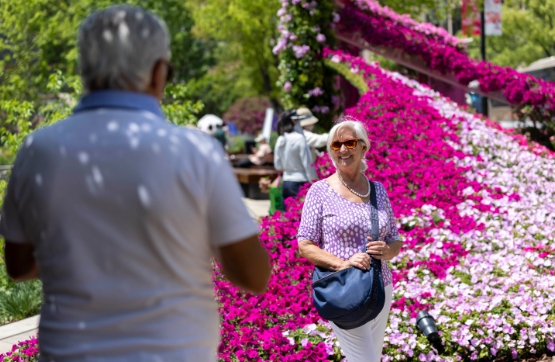Instant tax refunds give wings to China Travel

A foreign tourist poses for photos with flowers at a venue of the 2025 Shanghai International Flower Show in Huangpu District of east China's Shanghai, April 18, 2025. (Xinhua/Wang Xiang)
At a bustling department store in Guangzhou, south China, a Singaporean surnamed Lee picked up more than just premium Chinese tea for friends and family -- he also walked away with a tax refund, pocketed instantly at the point of purchase.
"Super convenient," said the tech entrepreneur, who was in town for a tech fair, applauding China's new refund policy that spares international travelers the long queues at airports and puts money back in their accounts then and there.
China is expanding the coverage of instant tax refunds to improve the experience for international travelers. In Shanghai, the service has been available in about half of the city's tax refund partner stores.
The policy, extended nationwide on April 8, builds on a slew of recent efforts by China to boost global exchanges and mobility, such as easing its visa policies, enhancing payment accessibility, and streamlining customs clearance.
These shifts have made exploring the country easier than ever, fueling a surge in "China Travel" content on social media platforms. For example, U.S. content creator IShowSpeed documented his kung fu journey at the famous Shaolin Temple in central China, captivating global audiences.
In 2024, China recorded 64.88 million border crossings by foreign nationals, an 82.9 percent increase year on year. In the first quarter of 2025, this number stood at 17.44 million, up 33.4 percent compared to the same period in 2024.
During Lee's ten-day stay in China, he zipped through industrial parks, financial centers, and high-tech hubs across the industrial powerhouse, bringing home not just souvenirs but also promising partnerships.
Analysts believe that the recent expansion of the tax refund policy will increase spending by inbound travelers, spur growth in China's tourism sector, and draw more visitors eager to explore the country.
On the ground, the effects are already visible. At the Grand Pacific, a shopping mall in downtown Beijing, staff reported long queues at tax refund counters. "It's now routine to see waves of foreign tourists lining up. Some leave with a few items, others with entire hauls," one employee said.
Qin Yi, manager of a porcelain shop in Shanghai, noted that foreign tourists who receive instant tax refunds in cash often make additional purchases on the spot -- a trend that has helped drive up the store's overall sales.
Inbound consumption in China is expected to exceed 1.5 trillion yuan (around 205 billion U.S. dollars) over the next five years, said economist Hong Tao at Beijing Technology and Business University. In 2024, inbound travelers spent over 94.2 billion dollars in China, according to the National Bureau of Statistics.
As U.S. tariffs inflate the cost of Chinese imports, traveling to China makes more economic sense for savvy American shoppers.
Thanks to the new transit policy for citizens from 54 countries, including the United States, Americans can now stay in the country for up to 240 hours without a visa. Pair that with the freshly expanded refund-upon-purchase policy, and travelers would get a compelling formula: travel, shop, save -- and repeat.
"There's no middleman taking a cut," as many put it. And the math checks out: with an 11 percent refund rate, spending 10,000 yuan gets people 1,100 yuan back. Though a service fee is charged, luxury goods, electronics, and other high-value items still look a lot more attractive.
Far from dimming their allure, U.S. tariffs have thrown a new spotlight on Chinese products, long prized for both quality and affordability.
"If the high U.S. tariffs persist, we may see the rise of a 'daigou' trade," said Wang Huayu, an associate professor of fiscal and tax law at Shanghai Jiao Tong University, referring to a practice that Americans pay intermediaries to shop in China on their behalf.
However, delivering a premium shopping experience to attract inbound travelers requires more than policy changes, said experts.
It is important to bring more shops and a wider range of goods into the refund-upon-purchase program, said Hong.
Wang Peng, a researcher at Beijing Academy of Social Sciences, pointed to the power of digital contracts to slash the tax refund process down to mere seconds.
He also highlighted how artificial intelligence could step in to ease peak-hour pressure, standardize shopping services, and close infrastructure gaps across regions.
In Guangzhou, where Singaporean visitor Lee explored, a commentary carried by a local newspaper on April 10 has called for more efforts to identify choke points to make shopping in China more enjoyable.
"I'll visit China again -- and next time, I'm bringing my family and friends along," said Lee.
Editor:伏娅敏
